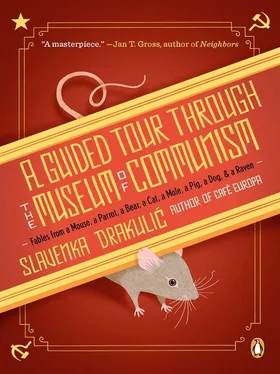Leafing through this handwritten notebook both out of a daughter’s sentimentality and curiosity, I discovered something interesting. Apart from notes about books she had read of late, thoughts for articles she intended to write, and quite lucid observations about her own illness, I found a kind of short diary from December 1981. Well, not a diary exactly, but notes about just one very particular case she had to deal with as a psychiatrist at the Tirana Psychiatric Hospital. As you can see for yourself, this slim, older volume was carefully glued into another notebook. Not only that, it was written with a pencil rather than a pen. I imagine she did it on purpose, so that she could erase certain details in case of an emergency. I mean, it is now 2009, and yet Mother took these notes to the hospital with her. Why? What was she hiding? Of whom was she afraid, even today?
As I started to read it, I soon discovered that she had good reason not to want to part with it, even on her deathbed. In it, she describes a meeting so peculiar that at first I was not sure whether I should believe it ever really happened.
The first entry is dated December 18, 1981:
This afternoon a raven flew into my doctor’s office through an open window. I was alone. My nurse had gone out on an errand, and perhaps that was the moment he had been waiting for. Nevertheless, I offered him a seat, but he preferred to stand during this first, brief, conversation. To an ordinary person he probably looked just frightened. But I immediately saw that he was in a state of a shock. He was shaking violently, could not concentrate, and had difficulty speaking—all the symptoms of severe distress were there. My first reaction was to give him an injection of a tranquilizer, which he refused. I was worried that he might experience a heart attack in such a state. He clearly was confused, disoriented, and delusional. Possibly a temporary psychosis?
After a while, he managed to tell me that he had come to ask if it would be possible to see me in private. Normally, if I had been on-call, I would have given him an injection and admitted him to our acute psychiatric ward. I would then have reported the case at our morning meeting the next day, whereupon the head of the psychiatric unit would have decided what kind of treatment he would get. If, after a few days of observation I had been put in charge of writing the report, he would have been diagnosed as not a very severe case and would have been injected with some more tranquilizers. Unfortunately, we do not have much choice in our methods of dealing with such patients. If, on the other hand, he had been diagnosed as a severely ill patient—well, then he would have been subjected to the more drastic so-called standard procedure. I happen to disagree with it, but I cannot say it so openly.
When Comrade Raven asked me to see him privately, I was taken by surprise. Who could have possibly told him about my interest in individual therapy (not to mention psychoanalysis, a word that I barely dare to write down)? Now it was my turn to get agitated: Such a visit could mean the end of my career. But I tried not to show him how much his question had startled me. My interest in different practices within psychiatry was not really a secret, because I had written academic articles about it. However, they were only about theory—presenting the ways in which colleagues in other countries dealt with particular kinds of psychosis. That was considered daring enough. But I had gone even further, and only a couple of close friends and colleagues know that I am actually treating a few patients privately (without payment, of course). Therefore, Comrade Raven’s presence in my office and his request could have meant only one of two things: that someone from our small circle of doctors had sent him to me for help—in which case I should have been informed. Or that my secret was out and Comrade Raven was here to arrest me. My “sin” was punishable in the same way as witchcraft. For a split second I had doubts as to which of the two was the case. But his state could not have been faked easily, so I decided that it really did not matter who he was, because Comrade Raven needed my immediate help.
I calmed him down and tried to find out what had happened to him. But my usual questions made Comrade Raven still more agitated, even frightened. I saw that there was no other way to soothe him than to promise that I would see him later that evening.
Reading Mother’s notes was very confusing for me. My first reaction was that this must have been some kind of mistake, or at best a joke. Why would a patient enter through the window in the first place? Was she serious when she wrote that it was a bird? Or was there something hidden behind this description? If so, how was I supposed to understand it?
Obviously she took the notes to the hospital knowing that they would come into my possession after her death, so they must have been especially important to her. But I must confess that, at the very beginning, I wondered if the notes weren’t the fruit of my mother’s imagination. Or if she hadn’t perhaps written them already under the influence of her not yet manifested brain tumor (which was discovered much later—luckily it was one of the slow-growing kind). Or were they the result of some of the medications she had been taking for her constant migraine? After all, she could have even been hallucinating. How else could I explain to myself the fact that my mother, in her diary, described a patient as—a bird? My mother was a psychiatrist, not a veterinarian! And even if she had been a veterinarian, it seems rather strange that a raven would have had the ability to talk, although there have been cases of this very intelligent bird being able to utter a few words.
I mean, yes, she worked with all kinds of delusional patients, but she would not have written something like this in her diary—look here, she wrote raven without quotation marks. She would not have written that without a reason. Besides, my poor mother was not very good at pretending! For example, in the next sentence she invites the “bird” to sit down. How naive she was, if indeed her intention was to hide something. And almost right away she calls this bird “Comrade Raven”?
The other thing I found strange in this excerpt was her claim that psychoanalysis, or even individual psychotherapy, was punishable. Surely she did not mean punishable by law, because there is no reference to it in the law at all. She must have meant ideological condemnation of this Western—and therefore, by definition, negative and dangerous—practice. By the way, I happen to know that there is astonishingly little psychoanalytical practice even today. Not only in Albania but in the whole of the formerly Communist Europe as well. Obviously, the Communists did not care about individuals, much less about the problems of their psyche. I visited Mother at her workplace a few times to get an idea…
Now, listen to this sentence again: “He had come to ask if it would be possible to see me in private.” This, I believe, must have been a very unlikely request at the time. First of all, the word “private” is a highly suspicious word in itself, in any context. In a Communist country where there is hardly any privacy, it is loaded with negative meaning, suggesting that a person has something to hide. Otherwise, why privacy? A stranger doesn’t walk into your office, much less fly in through the window and ask to see you in private—and in a human, if agitated, voice. She rightly suspected him of being an agent provocateur sent by the secret police. My mother was a pioneer when, as early as 1993, she started psychotherapy, publicly, with individuals in her work with hospital patients. In 1981, as she writes, she started this practice in great secrecy and with only a few nonhospitalized patients. What were the risks involved in seeing patients privately at that time? There was no such thing at all as private practice in Albania in 1981. I imagine she would not only have been stripped of her license, but also imprisoned. Therefore, it was perfectly possible, if the rumor about her seeing patients outside of the hospital leaked out, for an undercover policeman to have been sent to her disguised as a sick man imagining he was a bird. I have heard of such provocations, although Mother never spoke about it.
Читать дальше












